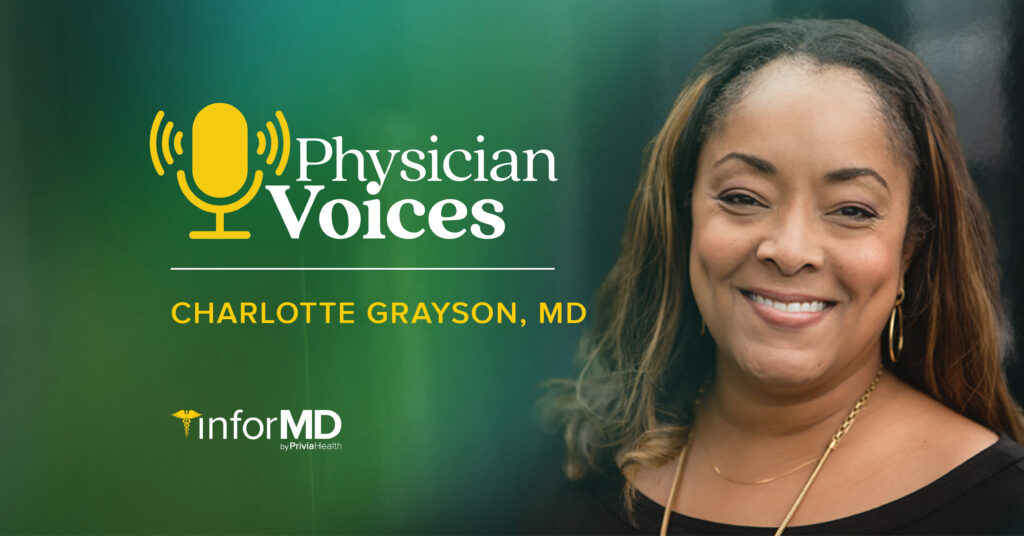Our “Physician Voices” series empowers doctors to share their unique stories, expert perspectives, and helpful insights. These candid conversations explore key topics, such as cultivating the doctor-patient relationship, operating an independent practice, navigating day-to-day challenges, and reimagining care delivery. By elevating the clinical voice, we aim to enable physicians to transform healthcare in the communities they serve.
What do you love most about the art, science, and practice of medicine?
For me, practicing medicine is like putting together a jigsaw puzzle. It’s about putting together the various pieces to create a cohesive picture. And it is not always just the medical issue we have to consider; medicine requires us to think about the psychological, sociological, and epidemiological aspects of every issue. There’s the science, but then there’s the person. And recognizing that and figuring out how to incorporate that into our everyday practice is the art.
What are the main challenges your specialty faces?
The main challenges I see for internal medicine doctors are burnout, poor compensation, and reduced numbers.
Our healthcare system is built on internists being gatekeepers. As such, we are relied upon to manage every aspect of our patients’ health. This is an important, pivotal role, but poor compensation is driving internists to subspecialize. That’s compounded by the crippling debt that many medical students take on to complete their training. Add to that the patient volumes we have to see, the tremendous amount of administrative tasks, and the overflow of work into personal time, and we are seeing significant burnout in our field.
The Quintuple Aim in healthcare seeks to enhance the patient experience, lower costs, improve population health, promote provider well-being, and advance health equity. Which component most excites you and where would you say healthcare is falling short?
I feel like I spend a lot of time managing all of these areas. But what really makes my day is when I’ve been able to take a patient who has a really poor understanding of their medical problem or a completely unmanaged condition and then turn it around. I see this a lot in my minority patients. It really takes time and patience (and multiple office visits, phone calls, and nursing resources) to listen to a patient, really understand what their circumstances and understanding of their health are, and guide them to make changes that significantly improve their health.
I also am aware that minority doctors really have a huge impact in this area. Minority patients will listen to a minority doctor, especially if we are able to convey a shared history or experience. People like doctors who look like them, share a common history with them, or just seem to understand them.
There’s a lot of power in understanding the diet of our Asian patients when they have diabetes and explaining to them what changes they need to make; understanding the limitations that Black women often place on themselves when it comes to exercise; or helping a patient understand just what diabetes is and isn’t.
It’s about going to patients where they are, understanding their perspectives on their health and well-being, and trying to work with them and within these systems to improve their health.
However, our healthcare system is not designed to help people in this way. We have expensive medications, 15-minute office visits, complicated information to convey, and the general lack of understanding different cultural, social, and ethnic norms.
How do you nurture and cultivate relationships with your patients?
I have been blessed to work in the same practice for over 15 years! In primary care, we often take care of entire families (in my case, adult families). I have great-grandparents, their kids, grandkids, aunts and uncles, and nieces and nephews. I love hearing their stories — their histories — and try to remember little details so I can recall them the next time I see them. I often try to relate to my patients on a non-medical topic. It could be the fact that we both are raising kids. Often it’s a shared love of reading, and so we share book recommendations. I always try to treat my patients like they are my family and close friends.
Charlotte Grayson, MD, is a board-certified internist at First Georgia Physician Group in Fayetteville, Georgia. She has lent her medical expertise to many consumer-focused medical guides including WebMD, Women’s Health, TIME, GlaxoSmithKline, Medtronics, CNN, Fox5 Atlanta, the American Heart Association, and Black Enterprise Magazine. Dr. Grayson is interested in women’s health, preventive medicine, geriatrics, and palliative care.










Related Articles
How to Keep Your Patients From Skipping Mammograms
Kristin Schraa, MD, with Virginia Women’s Center shares how women’s health providers can encourage patients ...
3 Ways Healthcare Can Integrate Behavioral Health and Primary Care
Integrating behavioral health with primary care can lead to better patient outcomes — but how ...
How Can Physicians Support Postpartum Mental Health?
On average, 13 percent of mothers in the United States will develop symptoms of postpartum ...
Engaging Patients in Annual Mammograms
Studies show that a little over 66 percent of women aged 40 and older get ...
What Do Medicare-Aged Patients Want in Their Healthcare?
Within the next 20 years, 20 percent of Americans will be 65 or older. It ...
How Health Systems Grow Stronger With Privia Health
Discover how we helped Health First upgrade technology, align physicians, and accelerate toward value-based care. ...